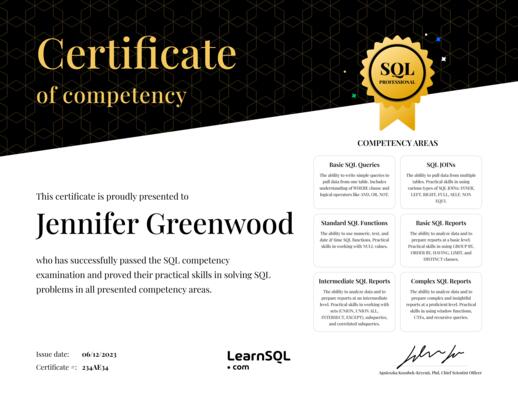Basic Course
SQL Basics in PostgreSQL
Gaining insight from collected data plays an important role in today's information-driven world. During this online course, you'll practically learn how to write basic SQL queries to find answers to your business questions in the PostgreSQL database. No previous IT experience required.
4.86
42,201 learners enrolled
Free trial Yes
Certificate of completion Yes
Time to complete 10 h
Coding challenges 130
Skills you will gain
- Use the SELECT to retrieve information from a PostgreSQL database. Write WHERE conditions with the use of logical operators, such as AND, OR, and NOT.
- Understand the LIKE, ILIKE, IN, and BETWEEN operators.
- Understand SQL set operations: UNION, INTERSECT, and EXCEPT.
- Use INNER JOIN, LEFT JOIN, RIGHT JOIN, and FULL OUTER JOIN.
- Create simple reports using the GROUP BY and aggregate functions.
- Work with one or more data tables.
- Write subqueries and instructions.
- Build basic reports from the ground.
Last reviews

Table of contents
Course progress 0%
Exercises completed 0/130
-
A little bit on databases
0/6Find out what relational databases are and get to know SQL – a language to talk to databases.
-
Selecting from one table
0/22Discover how to select data from a single table.
-
Querying more than one table
0/13Learn how to select data from multiple tables.
-
Aggregation and grouping
0/25Computations in SQL? Why not? You will learn how to group rows and compute statistics with aggregate functions.
-
More on JOINs
0/22Learn about various kinds of JOINs to best suit your needs.
-
Subqueries
0/22Queries within queries? That's right! Discover how to build and use subqueries.
-
Set operations
0/11Combine query results using set operations like UNION, INTERSECT or EXCEPT.
-
Quiz
0/9Check your SQL skills.

Get the Certificate of Competency in SQL
This certificate will confirm your practical SQL problem-solving skills

Description
This online course is designed for people who have no prior knowledge of databases. It will also be of interest to analysts who want to go beyond spreadsheets, students taking courses in relational databases, and more. Scroll down for details.
No matter what you do on the Internet, you always leave a mark. Whether you're seeking to buy a speaker or checking flights to Paris, your web behavior will be visible to professionals who can then analyze it and draw some conclusions.
Data is collected everywhere, and knowing how to analyze it helps improve decision-making. Analysts all over the world use spreadsheets to deal with their data, but over time, they reach the point where spreadsheets just aren't enough. Here's where SQL comes into play: When used in relational databases, like PostgreSQL, SQL is called "spreadsheets on steroids." So if you want or need to level-up your analytical skills, start learning PostgreSQL queries today!

In this beginner-friendly tutorial, you will find out what you need to start "talking" with the PostgreSQL database. That is, you will learn what relational databases are, how tables work, and how to write simple queries. If you're already feeling overwhelmed, don't worry!
Looking to get started in SQL? Give this course a try – the fascinating world of SQL queries is only a click away!
Everything will be explained systematically. Ultimately, after you complete PostgreSQL Queries, your boosted data analysis skills will let you go beyond those pesky spreadsheets.
We'll start by explaining how to use the SELECT statement to retrieve information from an individual table. The next step will be working with multiple tables; you will learn how to JOIN them, GROUP BY a specific metric, build unions and intersections, and perform an aggregation. Moreover, you will be introduced to dealing with subqueries.
At the end of each section, you will find a short quiz that will both check as well as consolidate what you've learned. If you complete all the exercises throughout the online course, you will be awarded with a certificate. You can publish your certificate on your LinkedIn profile, or print it out and show it to your boss.
Skyrocket your data analysis skills by learning PostgreSQL basics! Start the online course immediately to become an SQL insider.
What Do You Need to Take This Course?
Just a web browser and an Internet connection
What's in it for Me?
- 130 interactive, real-life-inspired exercises. Learn at your own pace, from any location and at any time. Work through hands-on exercises to help you retain what you have learned so far.
- Lifetime access to the course. When you purchase the online course, you'll get instant personal access to all of its content forever.
- Certificate of completion. After you successfully finish all of the exercises in the online course, you'll receive a downloadable PDF certificate to showcase your accomplishment. You can also publish your certificate on your LinkedIn profile.
- 30-day money-back guarantee. If you're not satisfied with the quality of the online course, you can get a refund within 30 days of your purchase.
- Exercise hints. You can take advantage of ready-made hints for every exercise, or ask questions and share insights with other members of our community through the Discuss tab.
Learn How to:
- Use the SELECT to retrieve information from PostgreSQL database. Write WHERE conditions with the use of logical operators, such as AND, OR, and NOT.
- Understand the LIKE, ILIKE, IN, and BETWEEN operators.
- Understand SQL set operations: UNION, INTERSECT, and EXCEPT.
- Use INNER JOIN, LEFT JOIN, RIGHT JOIN, and FULL OUTER JOIN.
- Create simple reports using the GROUP BY and aggregate functions.
- Work with one or more data tables.
- Write subqueries and instructions.
- Build basic reports from the ground.
Who Should Take This Course?
- Analysts fed up with spreadsheets
- Students enrolled in courses involving relational databases
- Beginner programmers working with PostgreSQL
- Business users working with PostgreSQL
- Anyone who wants to enhance their data analysis skills